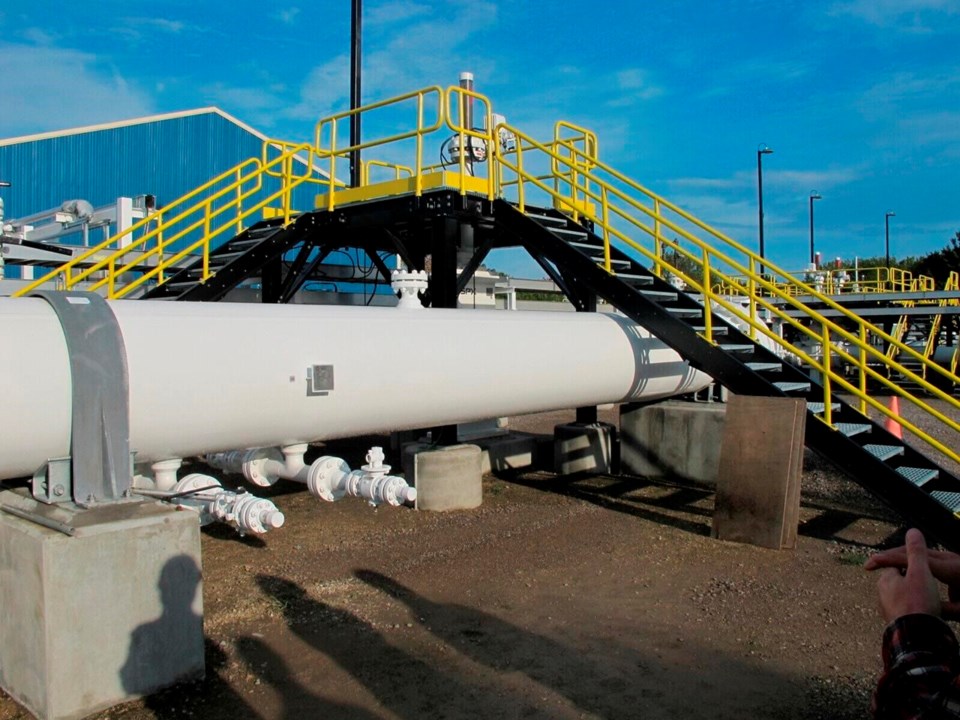CALGARY — Enbridge Inc. says negotiations to settle on a new tolling plan for its Mainline pipeline system are progressing, but the Calgary-based company declined to say when it expects an agreement to be reached.
"I don't think creating artificial timeframes on these things is a wise idea," said Enbridge CEO Greg Ebel, on what was his first quarterly conference call with analysts since assuming the top job.
"We obviously are continuing to serve our customers, we want to get to a solution as soon as possible."
A year ago, Enbridge's former CEO Al Monaco had said he expected the company would reach an agreement with its shippers about the Mainline pipeline by summer 2022.
However, that has not happened.
"We've made progress, but we're not there yet," said Ebel, who replaced Monaco as CEO on Jan. 1 of this year. "We don't have comments on timeline — I don't think that's helpful."
Enbridge has been consulting with oil shippers ever since its proposal to fill Canada’s largest oil pipeline network through long-term contracts was rejected by the Canada Energy Regulator in November of 2021.
Enbridge’s Mainline is Canada’s largest oil pipeline system, moving over three million barrels per day of petroleum products to market. The pipeline provides about 70 per cent of the total oil pipeline transportation capacity out of Western Canada.
The pipeline’s demand has exceeded capacity over the past few years, so Enbridge had applied to enter into long-term contracts for 90 per cent of the Mainline system’s capacity.
Enbridge had argued firm contracts would give customers more predictable access to the pipeline, but some Canadian oil producers argued the proposed change would worsen the existing capacity constraints and could lead to lower oil prices.
In rejecting the proposal in November, the Canada Energy Regulator concluded Enbridge’s proposal would dramatically change access to the pipeline. It said certain companies would benefit from long-term stability, but others would lose access to the pipeline.
Enbridge is now advancing two different scenarios — an incentive rate-making agreement that may be similar to the Competitive Toll Settlement agreement that expired on June 30, 2021, and a cost-of-service application.Â
On Friday, Ebel said the incentive format is still the preference for many pipeline shippers, but if a consensus can't be reached, Enbridge will go ahead and seek regulatory approval for a cost-of-service proposal.
"But as long as there is some progress, and as long as there is goodwill between the parties, that doesn't seem like the way to go — and that's where we are right now," Ebel said.
"I understand the frustration sometimes on this ... but our customers are very focused on this and there is good rapport between the players in trying to reach a solution. We may not get there, but we shouldn't create a false deadline to try to pull that off."
Enbridge reported a loss of $1.1 billion in its latest quarter as it took a $2.5-billion non-cash goodwill impairment charge related to its gas transmission business as a result of what it said was the increased cost of capital.
The pipeline company said the loss amounted to 53 cents per share for the quarter ended Dec. 31 compared with a profit of $1.8 billion or 91 cents per share in the last three months of 2021.
On an adjusted basis, Enbridge said it earned 63 cents per share in its latest quarter, down from 68 cents per share a year earlier.
The company said the drop in adjusted earnings was primarily due to higher financing costs from rising interest rates on floating-rate debt and increased depreciation costs on new assets placed into service in the fourth quarter of 2021.
Analysts on average had expected a profit of 73 cents per share, according to estimates compiled by financial markets data firm Refinitiv.
In its outlook, Enbridge reaffirmed its 2023 financial guidance, including adjusted earnings before interest, taxes, depreciation and amortization between $15.9 billion and $16.5 billion and distributable cash flow per share between $5.25 to $5.65.
This report by The Canadian Press was first published Feb. 10, 2023.
Companies in this story: (TSX:ENB)
Amanda Stephenson, The Canadian Press




